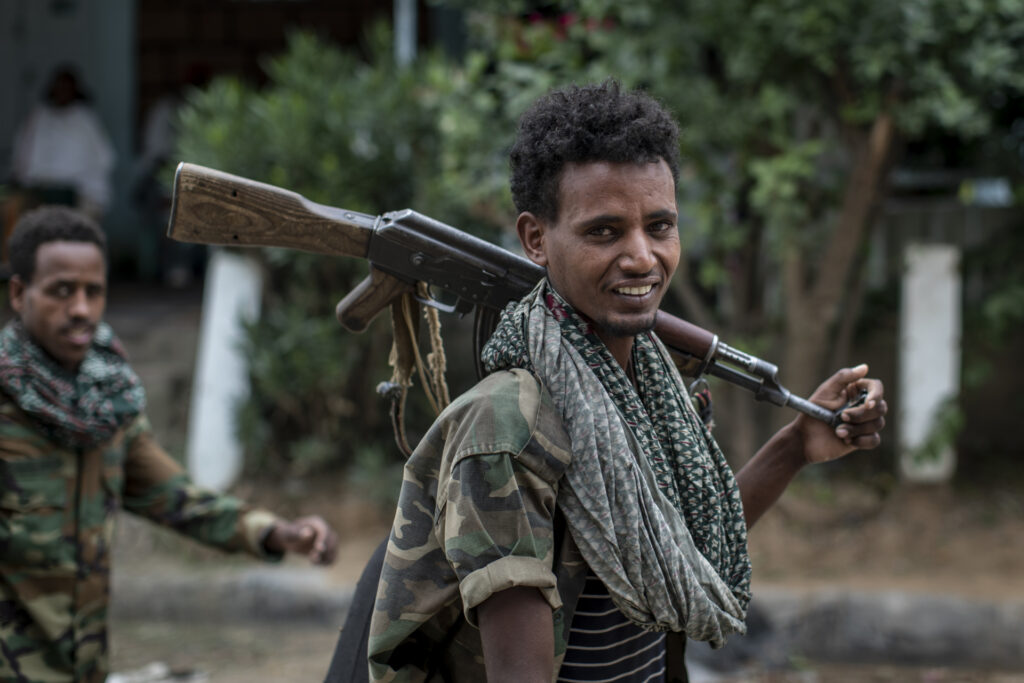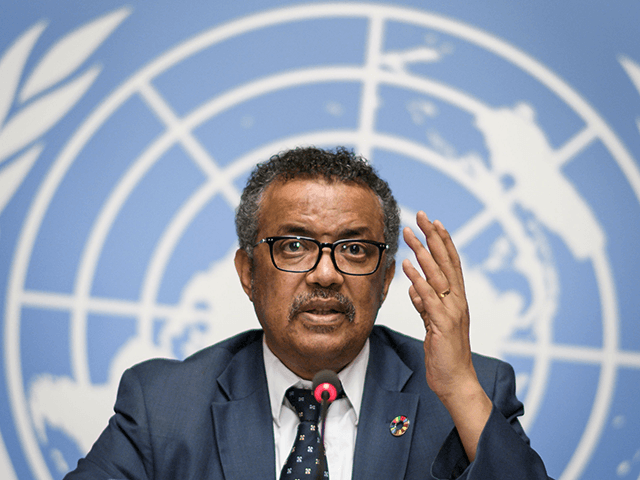World Health Organization (W.H.O.) Director-General Tedros Adhanom Ghebreyesus revealed on Wednesday that he had received notice that his uncle in Ethiopia had been “murdered” in a massacre that resulted in the deaths of at least 50 other people in his village.
Tedros blamed Eritrean troops for the alleged mass killings, which he said occurred in his native Tigray.
The W.H.O. chief made the revelation at a press conference to discuss the Chinese coronavirus pandemic and other health emergencies in Geneva as a means of explaining his visibly unsettled demeanor. He admitted to considering canceling the press conference but though it better to appear to in public and denounce the alleged killing.
The government of Ethiopia has been at war with the formerly ruling Tigray People’s Liberation Front (TPLF), a Marxist political party currently outlawed as a terrorist organization, since November 2020. Under Prime Minister Abiy Ahmed – a Nobel Peace Prize winner – Ethiopian troops have targeted not just TPLF members, but the entirety of the population of the northern Tigray region, blockading it and preventing food, medicine, and other basic necessities from entering.
Tigrayans also have little access to the internet or other communications, making it impossible to know what is fully happening in the region.
Just as the Ethiopian army has, TPLF fighters have faced accusations of grave human rights abuses including committing massacres and gang rapes against Amharic and Oromo people.

File/Fighters loyal to the Tigray People’s Liberation Front (TPLF) walk along a street in the town of Hawzen, then controlled by the group, in the Tigray region of northern Ethiopia on May 7, 2021. (AP Photo/Ben Curtis)
Abiy, an ethnic Oromo, has personally taken up weapons and appeared at the front lines of the war. He has been accused of genocide against the Tigrayans. Secretary of State Antony Blinken, who met with Abiy in Washington this week, had previously accused his government of “ethnic cleansing.”
Abiy won the Nobel Peace Prize for ending a war with Eritrea. Eritrean troops are believed to be heavily involved in the war against the TPLF, making it no longer a civil war. The Abiy government and TPLF are currently adhering to a tenuous ceasefire, but the deal to end hostilities did not include the government of Eritrea.
Tedros, a former senior TPLF leader who served as foreign minister of Ethiopia, is an ethnic Tigrayan.
“I was informed that my uncle was murdered by Eritrea,” Tedros told reporters on Wednesday, confessing that he almost canceled the press conference, feeling unprepared to be seen in public.
“I spoke to my mother and she was really devastated because he was the youngest from their family and he was almost the same age as me, a young uncle,” he continued, “so I was not in good shape. That’s why – but good I met you, actually.”
Tedros said his uncle was killed in his village home, presumably in Tigray, but did not name the village. He added that the uncle, who he did not name, was also “not alone.”
“In the village, when they killed him in his home, from the same village more than 50 people were killed. Just arbitrary,” he said.
“I hope the peace agreement will hold and this madness would stop,” he concluded.
Tedros also added a notice to his Twitter family, again accusing Eritrea’s military of committing the killing.
Neither the governments of Ethiopia nor Eritrea have responded to Tedros’ accusations at press time.
Tedros spent much of the beginning of the civil war in 2020 silent, but has since become – as arguably the world’s most prominent Tigrayan – a vocal critic of the war and the Ethiopian government generally. He has repeatedly accused those who care more about the war in Ukraine than the war in Ethiopia of racism and offered personal experiences with his family to humanize the tragedy.
“I will tell you my own story. I have many relatives there. I want to send them money. I cannot send them money. They’re starving, I know,” Tedros said in August. “I cannot help them. I cannot do that because they are completely sealed off. I want to speak to them. It’s a long time since I have spoken to them. I can’t speak to them. I don’t know even who is dead or who is alive.”
At the same press conference, Tedros emphasized that Eritrea’s role in the blockade was compounding the damage.
“What makes it even very unique, the Tigray situation, is it’s completely sealed off by both Ethiopian and Eritrean governments,” he said, “So, not only access to food is limited, it’s trickling now, and access to medicine is very limited, our programmes, HIV programme, TB programme, have collapsed.”
Tedros also insisted that his emphasis on stopping the civil war was not a result of personal bias, arguing that he had similarly attempted to intervene and send humanitarian supplies to Yemen, Syria, and Ukraine.
TPLF leaders began sounding the alarm more aggressively in September that Eritrea was heavily involved in the war.
“Eritrea is deploying its entire army as well as reservists. Our forces are heroically defending their positions,” TPLF spokesman Getachew Reda said at the time, previously warning that Eritrea had begun to call in older reservists to mobilize for war. TPLF fighters claimed that they were the subject of a “full-scale” Eritrean attack in September.
In November, the TPLF and Ethiopian government began a ceasefire that had been though, before Tedros’ comments this week, to be holding. Eritrea was not a party to that ceasefire, however, and the deal appears to only have stopped Ethiopian assaults on Tigray.
Abiy is currently in Washington for a pan-African summit hosted by the far-left administration of President Joe Biden. The Nobel winner met with Blinken on Tuesday for talks Abiy described as “candid and productive.”
“Secretary Blinken commended steps taken by the Ethiopian government to improve humanitarian access and begin restoration of essential services,” the State Department said in its readout of the meeting.
“Secretary Blinken and the Prime Minister also discussed the urgent need for all Eritrean forces to leave Ethiopia, which is to happen concurrently with disarmament of Tigrayan combatants,” the readout continued.
The State Department did not use the term “ethnic cleansing” in its summary of the meeting.

COMMENTS
Please let us know if you're having issues with commenting.